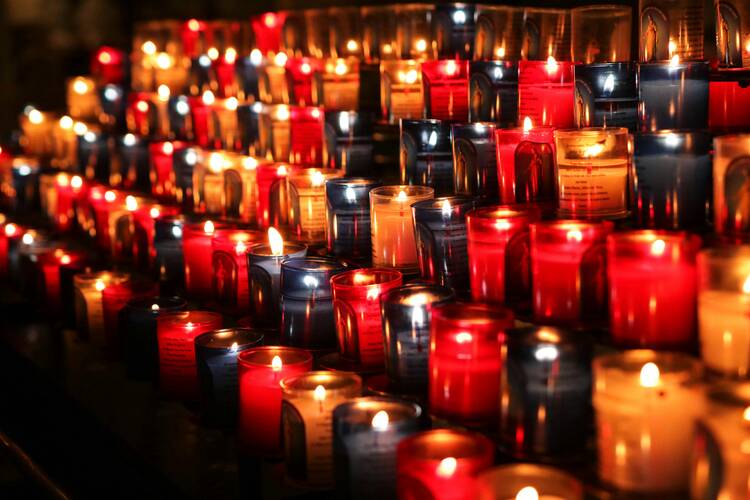A Reflection for Tuesday of the Fifth Week of Easter
Find today’s readings here.
In those days, some Jews from Antioch and Iconium
arrived and won over the crowds.
They stoned Paul and dragged him out of the city,
supposing that he was dead.
But when the disciples gathered around him,
he got up and entered the city.
On the following day he left with Barnabas for Derbe.
After they had proclaimed the good news to that city
and made a considerable number of disciples,
they returned to Lystra and to Iconium and to Antioch.
They strengthened the spirits of the disciples
and exhorted them to persevere in the faith, saying,
"It is necessary for us to undergo many hardships
to enter the Kingdom of God."
They appointed presbyters for them in each Church and,
with prayer and fasting, commended them to the Lord
in whom they had put their faith.
Then they traveled through Pisidia and reached Pamphylia.
After proclaiming the word at Perga they went down to Attalia.
From there they sailed to Antioch,
where they had been commended to the grace of God
for the work they had now accomplished.
And when they arrived, they called the Church together
and reported what God had done with them
and how he had opened the door of faith to the Gentiles.
Then they spent no little time with the disciples.
One of the interesting dynamics that begins to play out during the Easter season, when the first reading every day at Mass is from Acts of the Apostles, is that we get to witness the slow and stumbling growth of the nascent church in something that feels like real time. The narrative compression that can be found often enough in the Gospels (“Jesus increased in wisdom and stature,” to cover a couple decades of his life) is not nearly as present in Acts. The more blow-by-blow (sometimes literally!) account of the encounters among the early disciples and with the world they are seeking to evangelize gives Acts a different vibe, one that benefits from an episodic reading of it like we’ve had in these past weeks.
Today’s first reading is a classic example of the ups and downs experienced by the early disciples—and one where you can imagine them periodically taking to heart Jesus’ reminder in today’s Gospel that they should “not let your hearts be troubled or afraid.” In yesterday’s first reading, Paul and Barnabas are such a hit in Lystra that the locals declare them to be gods in human form. But today it all goes south—newcomers arrive in town and, we find, quickly “won over the crowd” and had Paul stoned. On Monday you’re Zeus Almighty, on Tuesday you’re target practice.
They shake the dust from their sandals—before that phrase had even become a cliche!—and go to Derbe, another town. There they find success again, and make “a considerable number of disciples.” Back to Lystra they go, seemingly with the realization that this whole church-planting thing is not going to be one long winning streak: “They strengthened the spirits of the disciples
and exhorted them to persevere in the faith, saying, ‘It is necessary for us to undergo many hardships to enter the Kingdom of God.’” It sounds a little like Daniel Berrigan’s stark warning to feel-good Christians in our own time: “If you want to follow Jesus, you better look good on wood.”
Then notice what happens. Having realized that not everyone is going to be evangelized in one fell swoop, that there is no magic formula for convincing everybody of the Way, they instead start to set up the structures that become the church we know today: “They appointed presbyters for them in each Church and, with prayer and fasting, commended them to the Lord in whom they had put their faith.” Having put the structures in place for each local community to survive and thrive, they go back to Antioch, reflect on all they’ve seen and done, and thank God who has “opened the door of faith to the Gentiles.”
What is the lesson there for us? I think it’s a question of “first fervor” and its eventual diminishment, when the initial enthusiasm for any project that feels God-sent becomes tempered by reality and by inevitable setbacks. That happens on a community level, to be sure, but how much more does it happen in our hearts individually?
The early disciples don’t give up, and they don’t get angry that things aren’t working out just as planned. They get practical. They remind each other that this whole Jesus project was always bound up with suffering, from the crucifixion to the martyrdom of Stephen to the stones that Paul seems to attract like flies. They start to build lasting structures that will still be there when they are gone. They look to each other for support. And they thank God for the good work that was accomplished even when their hearts and minds were somewhere else.








